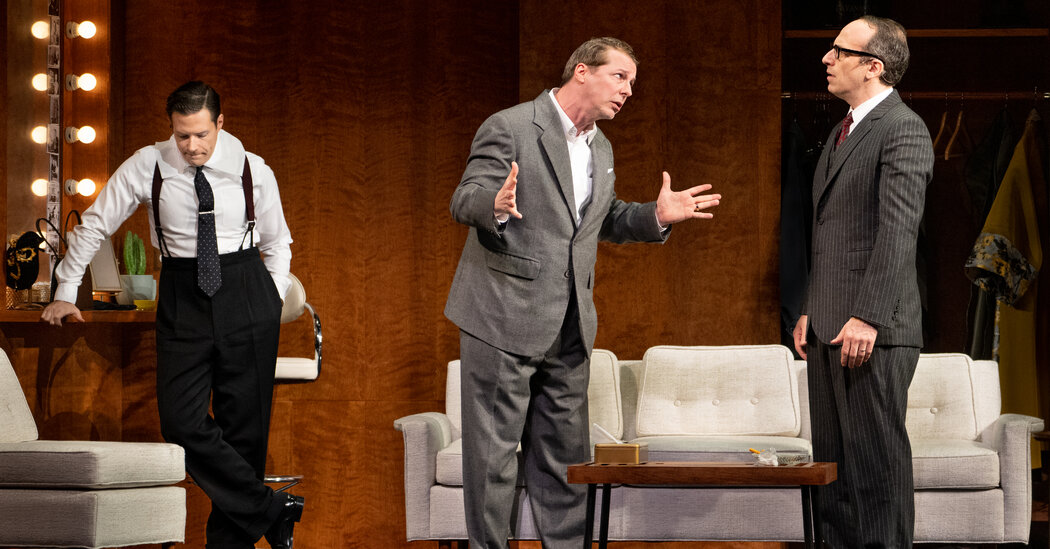
Oscar Levant, the troubled midcentury musician and wag, often said he’d erased “the fine line between genius and insanity.”
He says it again, or a version of it, in “Good Night, Oscar,” the unconvincing biographical fantasia that opened Monday at the Belasco Theater. But on the evidence of the character as written, and especially as impersonated by Sean Hayes in a gloomy if accurate performance, Levant doesn’t erase the line so much as fudge it.
Certainly the play, by Doug Wright, fails to make much of a case for the genius part of the joke. Instead, it offers a spray of Levant’s most famous quips, like the one about Elizabeth Taylor: “Always a bride, never a bridesmaid.” And instead of dramatizing how marvelous Levant was, it just says so repeatedly. “America’s greatest wit.” “A goddamn lion.” A Horowitz at the piano “with a grace and an ease that even Chopin might envy.”
Fulsome praise, but what we see in the director Lisa Peterson’s production is a far cry from any of it. Mostly it’s just a cry; Levant doesn’t seem brilliant but ill.
Pathos not being much of a dramatic engine, Wright works very hard, if fictionally, to crank up the stakes. It’s 1958, on the day during sweeps week when “The Tonight Show,” with its host, Jack Paar, will make its West Coast debut. Paar’s marquee guest, leading a lineup that also includes the sex symbol Jayne Mansfield and the ventriloquist Señor Wences, is Levant, who two hours before showtime hasn’t arrived. NBC’s president, Robert Sarnoff, threatens to replace him with the popular bandleader Xavier Cugat.
But where Sarnoff (Peter Grosz) sees Levant as unreliably neurotic, and thus unappealing to the network and the audience, Paar (Ben Rappaport) sees him as an artist whose unreliability and neurosis are exactly his strengths. He’s the national id: the man Americans hope they’ll catch “saying something on television they know damn well that you can’t say on television.” He’s good for ratings; no wonder Paar calls him his favorite mental patient.
That line is no joke. It is only thanks to the machinations of Levant’s wife, June (Emily Bergl, excellent), that Oscar has been sprung on a four-hour pass from the institution he currently calls home. When he finally arrives at the studio, with a miffed orderly (Marchánt Davis) in tow, he’s strung out, rumpled and morose. June calls him “Eeyore in a cheap suit.”
Hayes, no longer the adorable sprite from “Will and Grace,” has clearly made a careful study of Levant’s mannerisms, many of them the result of a longtime addiction to painkillers. The work is startling, but the performance is less an inhabitation of character than a nonstop loop of perfectly rendered facial tics, trembling hands and compulsive gestures. His speech is pressured, his mood explosive, his target anything that crosses his path — including himself. Past this stockade of behavior, little of an inner life can get out.
To address the built-in problem of revealing such a locked-down soul, and in the manner of period psychiatric melodramas like “Now Voyager” and “Bigger Than Life,” Wright gives Levant occasional reality breaks and hallucinations. Most involve George Gershwin: Levant’s friend, benefactor and bête noire, dead 20 years yet still a kind of Oedipal rival. “I’m scared to death of failure,” Gershwin’s glamorous ghost (John Zdrojeski) says. “But you? You don’t mind it.”
Whether or not Levant minded it, it’s true that by Gershwin standards he failed; few people today remember him. Huge swathes of dramaturgically suspicious exposition must thus be rolled out to cover the gaps. “I know the critics all say your greatest performance was in ‘An American in Paris,’” a young production assistant (Alex Wyse) tells Levant, and us. “That musical sequence — the Concerto in F — it’s a showstopper!”
When characters start informing other characters of what they would obviously already know, and (as often happens here as well) braying madly at mild jokes, something is wrong.
What that is becomes clearer when, in the second half of the 100-minute play, Levant finally sits down for the live broadcast, after proving himself merely tiresome for the first half. The music starts, the curtain rises, the lights come up, and he’s still tiresome. Firing off one-liners, especially nasty ones, is no mark of special genius; thousands of comedians do it. Nor does the fact that the one-liners come from a man who is obviously deeply troubled make them especially funny. For me, watching Hayes as Levant — like watching kinescopes of Levant himself — is excruciatingly sad.
The weight of shoring up the point of the play thus falls heavily on Levant’s pianism — and Hayes’s. Peterson, the director, has been building up to it from the beginning. The nested shoeboxes of Rachel Hauck’s handsome set, representing Paar’s office and, when that breaks away, Levant’s dressing room, now disappear entirely to reveal a fully padded television studio with a Steinway center stage. Hayes steps up to it and, after a last, mortifying fight with Gershwin’s ghost, proceeds to play a seven-minute excerpt from “Rhapsody in Blue.”
It’s fine.
Even if it had been mind-blowing, I don’t see how it would have given “Good Night, Oscar” a satisfying shape; issues raised in theatrical terms want to be resolved in them, too. Wright has followed that principle in “I Am My Own Wife,” his Pulitzer Prize-winning 2003 play, and in his book for the unconventional musical version of “Grey Gardens,” each of which uses the raw materials it was built from to fashion an organic conclusion.
“Good Night, Oscar” can’t get there, but it understands the problem. A coda following the concerto may not tie up the larger themes of genius and insanity but does resolve some relationships in the way you would expect from a melodrama set in 1958. Selflessness and renunciation are involved. Jokes that were formerly just origami with words now become ways of slipping painful truths past the interpersonal censors.
In those last few minutes only, you see into Levant’s soul. It is not a soul made for television, though that’s how most people of his time would have known him. Somehow they accepted him as he was, which may not have been a blessing. When asked, on a 1965 episode of “What’s My Line,” “Have you ever managed to make a great deal of use out of various illnesses that you’ve had?” he answered, “My health is the concern of the nation.” The blindfolded panel knew immediately who he was.
I only wish after “Good Night, Oscar” we did.
Good Night, Oscar
Through Aug. 27 at the Belasco Theater, Manhattan; goodnightoscar.com. Running time: 1 hour 40 minutes.













